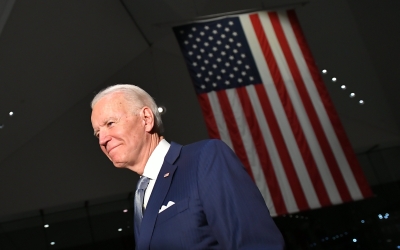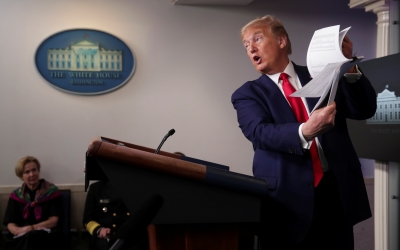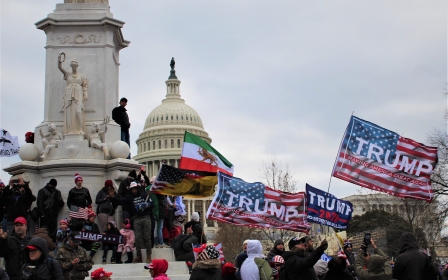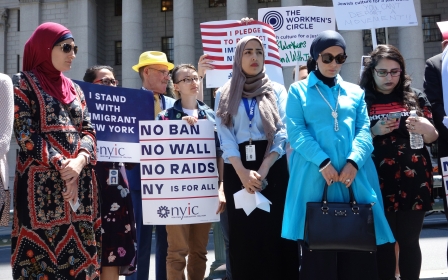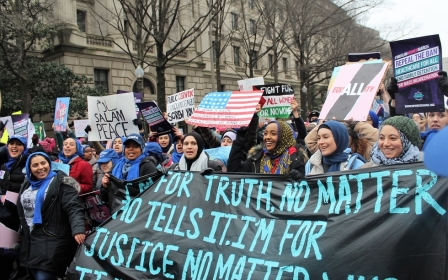'Historic moment': Biden reverses Muslim ban during first hours of presidency
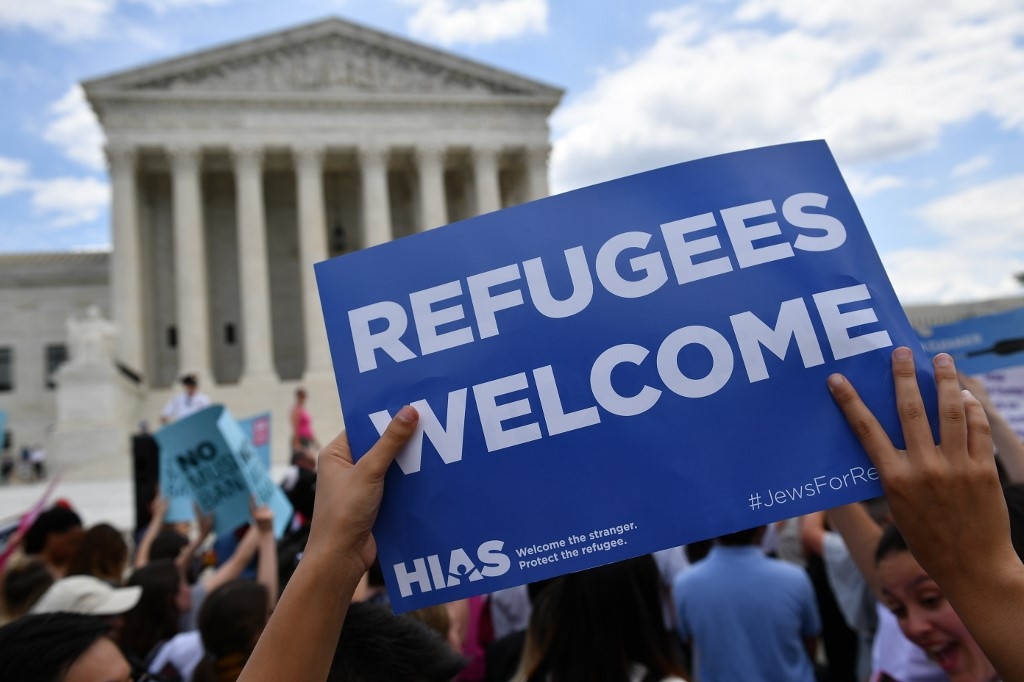
Hours after US President Joe Biden was sworn into office on Wednesday, he signed an executive order to repeal the Trump-era Muslim Ban, a move analysts say sets the tone for his administration's first term.
"I'm going to start by keeping the promises I made to the American people," Biden said, before tackling a stack of executive orders, including the Muslim Ban.
His administration had earlier described former President Donald Trump's most controversial policy as "xenophobia and religious animus."
"This ban, which restricted issuance of visas to individuals from many Muslim and African countries, was nothing less than a stain on our nation," Jake Sullivan, the incoming national security adviser, said of the ban in a briefing with reporters.
"It was rooted in xenophobia and religious animus and, President-elect Biden has been clear that we will not turn our back on our values with discriminatory bans on entry to the United States."
Implemented in 2017 during Trump's first week in office, the Muslim Ban initially restricted travel from seven Muslim-majority nations: Iran, Iraq, Libya, Somalia, Sudan, Syria and Yemen.
The ban faced several legal challenges, but the Supreme Court in 2018 upheld the final version of the measure, which covered 13 mostly Muslim-majority countries, ruling in favour of Trump's executive power to control immigration.
Biden had vowed to revoke the "vile" ban on his first day in office, calling the order an "assault on Black and brown communities".
Senate Majority Leader Chuck Schumer and Congresswoman Debbie Dingell both issued statements on Wednesday welcoming the Muslim Ban reversal, as did 81 civil rights, faith and community groups that had been working to overturn the measure.
'Setting the tone'
Abed Ayoub, legal and policy director at the American-Arab Anti-Discrimination Committee (ADC), told Middle East Eye that this "historic moment" resulted from the collective efforts of several human rights advocates and groups that had worked to challenge the ban over the past four years.
"It's been a struggle and it's been a fight for our community - for the Arab community and for the Muslim community - since almost day-one of the Trump administration with this ban," Ayoub said.
"Joe Biden is setting the tone by reversing the Muslim ban first thing," he said.
'Families have been destroyed, disintegrated and broken up because they have a cousin or brother or a son or a daughter or a loved-one or a fiance that is stuck abroad'
- Khaled Beydoun, law professor
Along with about a dozen actions taken on his first day in office, Biden also revoked the emergency order that sped construction of the wall along with US-Mexico border and lifted limits on the Obama-era Deferred Action for Childhood Arrivals (DACA) program, which shields undocumented immigrants who came to the US as children from being deported.
"It's all been a long time coming," Ayoub said. "This is a result of collective efforts from our partners over the past four years. It's definitely a historic moment, and it signals from the Biden administration that they are serious about moving away from Trump's immigration policies."
Ayoub described a great sense of relief among advocates in the Arab and Muslim community, who have been fighting against the travel ban since Trump first introduced the idea.
At the time, Trump had said the travel ban was set to be a temporary 90-day initiative, but Ayoub told MEE that even then he knew it was likely to last throughout the Trump presidency.
"The concerns the Arab and Muslim community had when this ban was being signed came to fruition," he said. "We knew this was not something temporary."
'Islamophobia is not going anywhere'
In those first days, thousands of protesters gathered at airports across the country after reports that legal permanent US residents - green card holders - from banned countries were being detained in multiple airports. Mayors, lawmakers and other notable figures showed up at the demonstrations to voice their dissent against the ban.
"Those protests at the airport - our community won't ever forget that support," Ayoub said.
In July, the Democratic-led US House of Representatives also stepped up, passing a bill that sought to repeal the travel ban, but it had no hope to become law as the Republican-held Senate refused to bring the legislation up for a vote.
Khaled Beydoun, a law professor from Detroit focused on Islamophobia in the United States, told MEE that he never expected Trump's Muslim ban to get so far. He thought it would die as a campaign promise: "I didn't think he'd follow up with an actual order."
After Trump followed through, Beydoun said he expected "the modern Supreme Court" to knock it down.
While taking the time to celebrate Biden's decision to reverse the ban and overhaul Trump's immigration policies, Beydoun is now more sceptical of the US system and of the prospect that such a ban could re-emerge in the future.
"It's not going to happen under a Democratic Party administration," Beydoun said. "But if the Republican Party remains the way Trump has moulded it, then there's a possibility it could happen again."
"Islamophobia is not going anywhere," he continued. "Anti-Muslim animus precedes 9/11, so the demonisation of Muslims, especially with this rise of white supremacy, that's here to stay, socially."
'Huge backlogs'
For now, Beydoun stressed that signing an order to repeal the Muslim Ban is just the first step in reversing the damage done to thousands - if not tens of thousands - who have been waiting for years to reunite with family members or to escape dire situations.
"Foreign nationals, immigrants and refugees from places like Yemen - which is on the ban, and obviously war-torn - they've been directly affected considerably," Beydoun said.
"But I also have family, friends and community members from places like Yemen, Somalia and Iraq, who have been indirectly affected, because they can't send remittances back home because of fear of being tied to terrorism.
"Families have been destroyed, disintegrated and broken up because they have a cousin or brother or a son or a daughter or a loved-one or a fiance that is stuck abroad," he continued.
Reversing the effects of the ban will take time, as the federal bureaucracy works to sort through all the cases that had been rejected or put on indefinite hold.
"Immigration is encumbered by huge backlogs," Beydoun noted.
"There's a need for administrative judges and there's a need for more manpower within the immigration apparatuses, which is why you have a lot of individuals, you know, languishing in cells or people's applications that have been delayed for years.
"That's an issue of manpower, it's not an issue of policy, so that's not going to change in the short term with Biden, right, because our immigration system is understaffed, and in some ways it's broken," he continued.
'Policies that precede Trump'
Diala Shamas, a human rights attorney at the at the Center for Constitutional Rights (CCR), stressed that the Muslim Ban was far from the only discriminatory immigration policy that needed to be reformed.
"I think it would be a mistake of us to just celebrate this victory and not move with extreme caution vis-à-vis this new administration. We need to push them to not just repeal what is hands down one of the most egregious Trump administration moves, but to actually go and consider the sort of long-standing history of anti-Muslim and anti-immigrant policies that precede Trump," Shamas told MEE.
"We don't want to simply roll back to the status-quo pre-Trump," she continued. "Many of us have been working really hard to remove all sorts of discriminatory aspects of our immigration system before Trump ever came along."
Shamas pointed to the little-known Controlled Application Review and Resolution (CARRP) Program that was launched covertly by the US Citizenship and Immigration Services (USCIS) in 2008.
CARRP was brought in to "ensure that immigration benefits are not granted to individuals and organisations that pose a threat to national security", but the effects have disproportionately targeted Muslim and Arab applicants.
'It's important to pause and celebrate this victory, but we shouldn't lose sight of the longer-term goals'
- Diala Shamas, Center for Constitutional Rights
The American Civil Liberties Union (ACLU) has worked for years to repeal CARRP, warning that the system "relies on deeply flawed mechanisms" to identify national security concerns, including "error-ridden and overbroad watch-list systems and security checks" and religious, national and racial profiling.
"Predictably, the CARRP programme not only catches far too many harmless applicants in its net, but it has overwhelmingly affected applicants who are Muslim or perceived-to-be Muslim," the ACLU said in a 2013 report.
While the US Constitution "expressly forbids" USCIS from creating its own rules of naturalisation, the programme has continued unhindered by directing agency officers to delay and ultimately deny immigration applications of those it has blacklisted, the ACLU noted.
It does so, the ACLU said, without telling applicants that they were labelled as a threat to the US or giving them an opportunity to respond to allegations against them.
"We need to keep holding the administration's feet to the fire, we need transparency, we need Congress to look into programmes like CARRP and we need to seriously re-examine our reliance on overbroad tools like the No-Fly list and the Selectee list and the various 'terrorism' databases - all of these things should be up for reconsideration if we're truly going to get at the core of the anti-Muslim and anti-immigrant sort of apparatus," Shamas said.
"It's important to pause and celebrate this victory, but we shouldn't lose sight of the longer-term goals."
Middle East Eye propose une couverture et une analyse indépendantes et incomparables du Moyen-Orient, de l’Afrique du Nord et d’autres régions du monde. Pour en savoir plus sur la reprise de ce contenu et les frais qui s’appliquent, veuillez remplir ce formulaire [en anglais]. Pour en savoir plus sur MEE, cliquez ici [en anglais].


